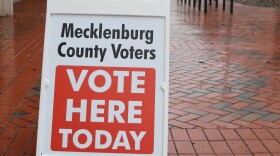The North Carolina House Committee on Elections and Campaign Finance Reform held a discussion-only session Tuesday to consider a bill that would ease public access to confidential voting records.
The bill has raised concerns among voting rights advocates and Democrats in the GOP-controlled state legislature. Among the changes the bill would make, voted ballots and something called cast vote records, or CVRs, would be accessible by public records requests.
Under current state law, such confidential records are publicly available by court order only.
“Transparency is great,” Rep. Pricey Harrison, a committee member and Democrat representing Guilford County, said at Tuesday’s meeting. “But there’s a concern about potential loss of confidentiality of the ballots.”
Harrison also expressed her concern that the move to make CVRs more publicly accessible has been championed by 2020 election deniers like MyPillow CEO Mike Lindell, who used his so-called “Moment of Truth” summit in Springfield, Missouri, last year to exhort followers to flood local elections offices with records requests demanding access to CVRs.
The bill is modeled on legislation drafted by the North Carolina Election Integrity Team, or NCEIT, which is a chapter of the Election Integrity Network, an organization founded by Cleta Mitchell. Mitchell is a North Carolina-based attorney and notorious for her role in trying to help Donald Trump overturn the 2020 presidential election results in Georgia.
In a telephone interview with WUNC this week, NCEIT President Jim Womack said that greater public access to CVRs would bolster public confidence in elections administration.
"It opens up the opportunity to assure the public that the machines are not corrupted, or the machines are not flipping votes," Womack said.
Ann Webb, policy director for Common Cause North Carolina — a civil and voting rights advocacy group — does not totally disagree with Womack and backers of making CVRs more publicly accessible.
“We fully support transparency in elections and election audits,” Webb told the committee in a public comment period, adding that she appreciated the slowing down of the legislative process on this bill.
“We have an utmost concern for voter privacy, I think we all do,” Webb added, urging lawmakers to take adequate steps to make sure that CVRs and other voting records, should they become more easily accessible to the public, are thoroughly anonymized.
Webb also expressed the concern that requiring state and local elections agencies to redact and prepare voted ballots for public release would be very costly and that lawmakers needed to consider the fiscal impact such requirements would have. Indeed, the bill contains no appropriations and one of the bill sponsors acknowledged the state budget currently under consideration has no money especially devoted to funding the preparation of such confidential records for public release.
Through its legal counsel, the State Board of Elections submitted some recommendations to the bill sponsors, including that they remove an entire section of the proposed legislation. The bill as written would seemingly enable counties and their local elections boards to circumvent the state elections board’s authority and dispense with vote tabulating machines altogether in favor of hand counting ballots.
"There has been a recent movement among certain activists to have volunteers hand-count ballots rather than rely on federal and state-certified voting tabulators to ascertain election results," the letter said. "This has resulted in individual counties in some states seeking to hand count their ballots, against the wishes of the state’s election administration."
The letter went on to say that doing so is "widely opposed by experts in election administration" except in very small jurisdictions where hand-counting wouldn't be cost prohibitive or prone to error.
Last week, California's Democrat-dominated state legislature passed a law that would require vote counting machines and ban hand counting in elections across most of the state. The law was passed in response to an effort by right-wing elections officials in one county that wanted to mandate the use of hand counts.
“I read that concern from the state board,” Rep. George Cleveland, R-Onslow, one of the bill sponsors, said at Tuesday’s committee meeting. “And, at this point — and I’m only one vote on this — I agree with their concerns, and we shall work to make sure that the state still has control over that.”
The bill sponsors said they would be meeting Wednesday to consider recommendations and amendments to the bill before bringing it back to the committee in modified form.








